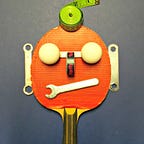Talent in Table Tennis
What is talent and how important is the talent for success?
Talent — what it is
When we say talent we often mean the combination of great technical skills and the ability to read the game well and foresee the next stroke by the opponent. Sometimes we silently refer to inherited abilities, genetic talent.
But, game mechanics and game perception, as well as feeling or ball sense, and technical skills are not so much about genetic talent, as people in general think.
What you need to have “talent”, to have high skills and great game perception, are mainly these four things:
- Interest, a curious mindset, willingness to learn
- Will to win, willpower, ambition, drive, motivation, goal orientation, passion, grit, persistence
- Capability to analyze and having powers of deduction (an ability to see connections and solutions)
- Exercise diligence — lots, lots and lots of practice
Most are things you as a player can affect yourself. You can start with a good physical condition.
Besides, talent requires resources, in the form of time and money. You also might need inspiration and support from parents and the table tennis club.
So, in the above definition of talent, having talent is not the same as being successful. To be the winner, you also need other capacities related to the psychological areas. Some people are very “talented” but don’t succeed in competitions. This can be due to nervousness or concentration difficulties. Or lack of courage or self-control. Yet, your mental strengths can be trained and improved.
Talent and prerequisites
Of course, not everyone can be as good, no matter how much we practice.
We all have different physical and mental prerequisites. For each body system, such as balance, nervous system, muscles, and so on, we all have a maximum potential. What is important is that each system is challenged and trained early enough and at the right times in the development of the body during childhood and youth.
The difference in body physique and neurological and cognitive abilities play a role in how good you can be in table tennis. How tall you are does not seem to play a major role.
You can control your weight yourself by balancing your energy intake and your energy expenditure (diet and exercise).
You may also be disabled — either intellectually or have a lack of mobility, strength, etc., due to illness or accident.
Age can reduce mobility, strength, endurance and balance, but the largest negative impact of older age might be the ability to react fast enough.
Interestingly, it is really good to be left-handed in table tennis. A proof of this is that about 30% of all table tennis players, even at the elite level, are left-handed, while only about 11% of the general population are left-handed. In other racket sports like badminton, squash, and tennis there are only about 15% left-handed players. This fact probably has to do with the speed and spin in table tennis, along with tactical opportunities for left-handed players.
Talent and future competitive strength
It may sound tough, but the motivated players who succeed best in competition are those who have the mental strategic strength, and the physical strength, to endure the thousands of hours of training practice that are needed to reach the top. Research supports this fact.
Research also shows the following:
- Achievements at a young age can not predict future success.
- Tools that focus on intellectual ability and perception as well as the skills of coordination, can be used to relate to current skill level. They can be used to distinguish elite from non-elite. But they are not confirmed to work as predictive tools. So it seems cognition is a major part of talent.
- There is moderate evidence that the measurement of mental and goal management skills actually can predict future performance. So it seems goal orientation is a major part of talent.
References
Journal of Sports Sciences, Volume 34, Issue 5, 2016, pages 395–410
Assessing personal talent determinants in young racquet sport players: a systematic review
DOI: 10.1080/02640414.2015.1061201
Irene R. Fabera*, Paul M.J. Bustina, Frits G.J. Oostervelda, Marije T. Elferink-Gemserbc& Maria W.G. Nijhuis-Van der Sandend
The 13th ITTF Sports Science Congress May 11–12, 2013, Paris, France
Top athletes handedness in the major racket sports
Ivan Malagoli Lanzoni, Gabriele Semprini, Rocco Di Michele and Franco Merni
